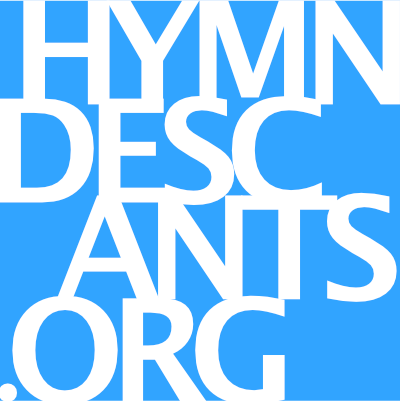AUDIO DEMO: intro - hymnal verse - descant verse Free score.
1 hymnal
Jerusalem the golden,
with milk and honey blest,
beneath thy contemplation
sink heart and voice oppressed:
I know not, oh, I know not,
what joys await us there;
what radiancy of glory,
what bliss beyond compare!
4. descant
Oh, sweet and blessed country,
the home of God's elect!
Oh, sweet and blessed country,
that eager hearts expect!
Jesus, in mercy bring us
to that dear land of rest,
who art, with God the Father,
and the Spirit, ever blest.
The hymn Jerusalem the golden derives from the monumental 12th C. poem De contemptu mundi ('On contempt of the world') by Bernard of Cluny, a Benedictine monk of whom little (not even his parentage, despite some 19th C. notions) is known apart from his writings. These include this work, as well as some treatises, sermons, the hymn Daily, daily, and a signature chronicle of monastic life - all composed in particularly fine Latin. De contemptu mundi is a 3000-line diatribe addressing the secular and religious failings afoot in the world, sparing no one, including from top to bottom his own church of Rome. But the work begins with a vision of the heavenly land, which describes the glorious hope of the new Jerusalem to come. John Mason Neale based his translation on an 1849 excerpt by Anglican archbishop Richard Chenevix Trench, which had already appeared in twenty hymnals. Jerusalem the golden was widely adopted by the Anglican church, dissenting churches, the Roman catholic church, and was appearing at 'dedications and festivals,' to use Neale's own words. The doxology was adapted by the editors of Hymns Ancient & Modern from the final verse of a different hymn from Bernard's work, also translated by Neale ("For thee, O dear, dear country"). Neale noted that the original was written in 'a dactylic hexameter, divided into three parts, between which a caesura is inadmissible,' a challenge of epic proportions.
A career military officer (and amateur composer), Alexander Ewing wrote his eponymous tune for an Aberdeen choir in 1853, to the passage "For thee, Oh dear, dear country." His tune was subsequently adapted (without permission) in duple meter for Hymns Ancient and Modern (1861), where it was married to Neale's Jerusalem the golden, with the original doxology appended. Lack of permission notwithstanding, Ewing's beautiful composition gained the enduring life it deserves. This tune has also been called Argyle, St. Bede's, and Bernard.
Dictionary of Composers for the Church in Great Britain and Ireland (Google Books)
The Heavenly Land (Bernard of Cluny, tr. Samuel Duffield)|
The Celestial Country (John Mason Neale, 1866)
Wikipedia – Bernard of Cluny
Wikipedia – Jerusalem the Golden (hymn)
The Hymnary– Composer and tune
The Hymnary- For thee O dear, dear country
Descant verse
O sweet and blessed country, the home of God's elect!
O sweet and blessed country, that eager hearts expect!
Jesus in mercy bring us to that dear land of rest,
who art with God the Father, and Spirit ever blest.

